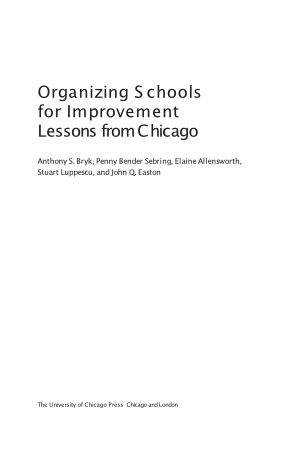This book by current and former researchers from the UChicago Consortium provides a detailed analysis of why students in 100 public elementary schools in Chicago were able to improve substantially in reading and math over a seven year period and students in another 100 schools were not. Using massive longitudinal evidence, the study yields a comprehensive set of school practices and school and community conditions that promote improvement, noting that the absence of these spells stagnation.
Download Appendix: Survey Measures, Factors, Composite Variables, and Items Used in Organizing Schools for Improvement: Lessons from Chicago
Organizing Schools for Improvement: Lessons from Chicago
- Purchase from your favorite bookseller or the University of Chicago Press
- Preview the Prologue
Symposium on January 14, 2010
- Watch the video
- Authors' Presentation
- About the Presenters
- The Essential Supports Flier
- Truly Disadvantaged Schools Flier
- Supplemental Information Packet
To send a request to the authors, please send an email to organizingschools@uchicago.edu
About the Book
This book by researchers from the Consortium on Chicago School Research (UChicago Consortium) provides a detailed analysis of why students in 100 public elementary schools in Chicago were able to improve substantially in reading and math over a seven year period and students in another 100 schools were not. Using massive longitudinal evidence, the study yields a comprehensive set of school practices and school and community conditions that promote improvement, noting that the absence of these spells stagnation.
These five essential supports are: school leadership, professional capacity, parent-community ties, student-centered learning climate, and instructional guidance. In contrast to many current reform efforts that seek to spur progress through one or two of these elements, this book shows that substantial school improvement requires building the social organization within schools and orchestrating initiatives across multiple domains.
Moving beyond the schoolhouse, the authors analyze community context to discover the ways internal practices of improving schools are inexorably entwined with the social resources of local neighborhoods. They raise troublesome questions about our society’s capacity to improve schooling in its most neglected communities. For schools in these communities, the task of improvement is much more formidable than most have acknowledged to date.
These findings are particularly timely as school districts nationwide launch a new round of efforts to turn around their most troubled schools. Urban education professionals and policy makers alike will learn valuable knowledge from this pioneering undertaking in Chicago.
Education Next has ranked Organizing Schools for Improvement 8th in a poll of the best educational policy books of the last decade.
Media Coverage of Organizing Schools for Improvement: Lessons from Chicago
Why Collaboration is Vital to Creating Effective Schools
Washington Post, 5/2/13
The Best Books of the Past Decade According to Ed Next Readers
Education Next, 1/5/11
The Most Important Research on Urban School Reform in the Past Decade?
Educational Researcher (December 2010, vol. 30, no. 9 pp. 665-667)
Review of Organizing Schools for Improvement
Teachers College Record, 8/30/10
Beyond the Beltway with Bruce DuMont
(radio version) WBEZ-FM, 5/9/10
Book learning
The University of Chicago Magazine, 4/1/10
About the Authors
Anthony S. Bryk is president of the Carnegie Foundation for the Advancement of Teaching and was founding senior director of the Consortium on Chicago School Research, University of Chicago.
Penny Bender Sebring is founding co-director of the Consortium on Chicago School Research at the Urban Education Institute, University of Chicago.
Elaine Allensworth is director for statistical analysis of the Consortium on Chicago School Research at the Urban Education Institute, University of Chicago.
Stuart Luppescu is chief psychometrician at the Consortium on Chicago School Research at the Urban Education Institute, University of Chicago.
John Q. Easton is director of the Institute of Education Sciences, U.S. Department of Education, and former executive director of the Consortium on Chicago School Research at the Urban Education Institute, University of Chicago.
Praise for Organizing Schools for Improvement
"Let us hope this book redirects our attention to what really matters in urban education. Beneath the numbers, there is a fundamentally optimistic view of the potential of urban schools. The authors give us every reason to believe that understanding the organizational and cultural dynamics of schools can help us make them better, much better. If we attend to this work as we should, it can be a game-changer."
–Charles M. Payne, & Youngs, Frank P. Hixon Professor in the School of Social Service Administration at the University of Chicago
"This book will advance everyone’s thinking about key ideas in school improvement. I was excited by the authors’ willingness to go beyond descriptive facts to find out what specifically distinguishes two different student bodies with similar demographics. What is so important about this book is that it figures out and describes in various ways the vital role social capital plays both inside and outside school."
–Ellen Guiney, Director at the Boston Plan for Excellence
"Success with urban schools and urban students is a national imperative. The research presented by Bryk et al. provides a potential path to addressing it...the expertise of the researchers and the depth and breadth of their data are inarguable."
–Scheurich, Goddard, Skrla, McKenzie, & Youngs, Educational Researcher





